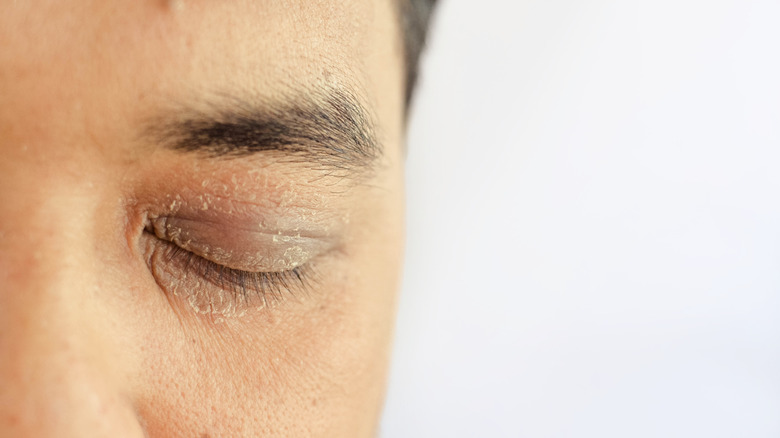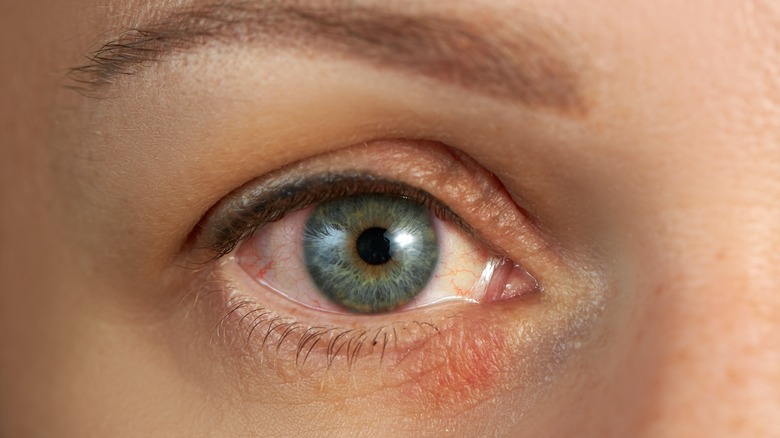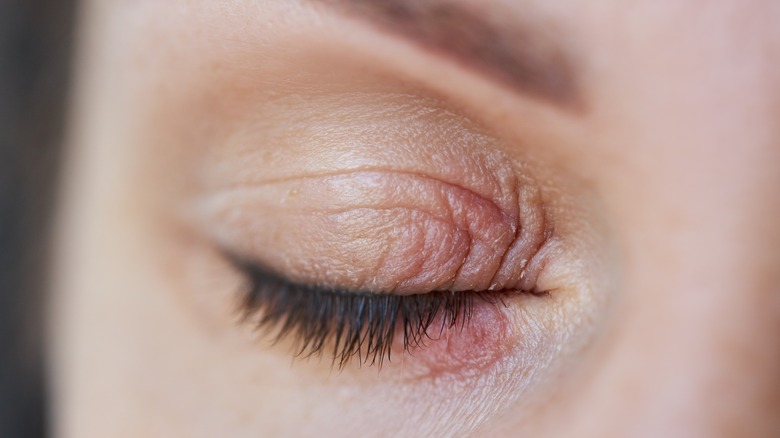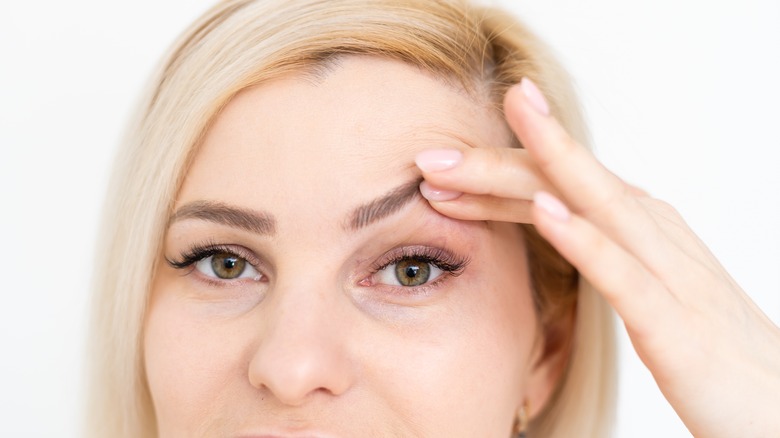What Causes Flaky Eyelids?
According to the University of Rochester Medical Center (URMC), the skin acts as a protective barrier against external factors and environmental toxins and regulates body temperature. The skin is made up of several layers of cells and tissues, including the epidermis, dermis, and subcutaneous fat layer. The epidermis, which forms the outside layer of the skin, consists of cells called keratinocytes. The dermis sits in the skin's middle layer and comprises blood vessels, connective tissue, and sweat and oil glands. Lastly, the subcutaneous fat layer is the innermost layer, which is made up of fat and collagen. The hypodermis helps to cushion and insulate the body, per URMC.
However, the skin on the eyelid is thinner and more delicate than the rest of the body's skin, says Healthline. It serves several important functions, including facilitating blinking movement, which is essential for lubricating the eyes, per a 2007 study published in the journal Skin Research and Technology. It's important to take good care of the eyelid skin to maintain health and appearance. However, the eyelids can sometimes become flaky and dry for several reasons.
Contact dermatitis and allergic substances
There are several possible causes of flaky eyelids. According to WebMD, certain skin conditions, such as contact dermatitis or atopic dermatitis (eczema), can affect the eyelids and cause flakiness. Contact dermatitis is a type of skin inflammation. According to Cleveland Clinic, contact dermatitis has two main types: irritant and allergic. Irritant contact dermatitis happens when the skin touches an irritant, for example, a soap, detergent, or cleaner.
Allergic contact dermatitis is caused by an allergic reaction to a substance. Certain metals (such as nickel) and medications (like antibiotics) can cause contact dermatitis in some people. Common symptoms of contact dermatitis include itching, swelling, and redness on the skin, says the clinic. It is also important to avoid contact with the substance that caused the reaction.
Allergies can also trigger a condition known as eyelid dermatitis, which causes the eyelids to become itchy and flaky (via Cleveland Clinic).
Blepharitis
According to Mayo Clinic, blepharitis is a condition that causes inflammation of the eyelids. It is a common condition that can affect people of all ages, but it is more common in men than in women, per Cleveland Clinic. According to the clinic, the two main types of blepharitis include anterior blepharitis and posterior. Anterior blepharitis affects the inner part of the eyelid and is usually caused by a bacterial infection. In some cases, anterior blepharitis may be caused by an allergic reaction to a substance in contact lenses or makeup. Posterior blepharitis affects the front of the eyelid and is often caused by problems with the oil glands in the eyelids, says the clinic.
According to Johns Hopkins Medicine, blepharitis is often a chronic condition, which means that it may come and go over time. Symptoms may include red, swollen eyelids, flakes of skin or crusting on the eyelashes, itching, and burning of the eyes. In some cases, blepharitis can lead to blurred vision or discomfort when wearing contact lenses. The condition may also cause the eyes to feel gritty or sandy.
The environment can also cause dry skin
Beyond contact dermatitis, various other causes of flaky eyelids exist. The environment is one of them. As mentioned earlier, the skin on the eyelids is thin and delicate, and it can easily become damaged by environmental factors. According to Healthline, living in a dry environment is also another factor, since dry air can cause the upper layers of the skin to lose moisture. This often leads to scaly eyelids, says Medical News Today.
Cold weather and low temperatures can also cause the skin to lose moisture, leading to dryness. The skin's barrier function, which helps to keep moisture in and irritants out, can be compromised in cold weather as a result, says Medical News Today. Indoor heating is another contributing factor to dry winter skin. The skin can become irritated, chapped, and cracked due to the dry air radiated, says the source. During the winter, we also tend to find comfort in having hotter showers. However, this can also have adverse effects on the skin's health.
Aging is another contributing factor
Aging is another contributing factor to dry eyelids. According to Healthline, the skin on our eyelids can become thinner and more prone to flakiness as we age. This claim is reiterated by the National Institute of Aging. According to the association, the skin becomes drier, thinner, and more fragile as the production of natural oils decreases with age. The skin also experiences a loss of collagen — a protein that helps to keep the skin plump and elastic. With age, the production of this protein decreases, leading to sagging and wrinkling of the skin (via Harvard T.H. Chan). The American Academy of Dermatology Association (AADA) further adds that the decline in estrogen levels during menopause can also contribute to skin dryness.
The skin's barrier function (which helps to keep moisture in and irritants out) as well as the sebaceous glands (which produce oil), also become less active with age, per a 2022 study published in the journal Frontiers in Cell and Development Biology.
How are flaky eyelids treated?
The treatment of flaky eyelids will depend on the underlying cause of the flakiness. If eyelid dermatitis is causing the flakiness, treatment may involve the use of corticosteroid creams or ointments to help to reduce inflammation and moisturize the skin, says Cleveland Clinic. If blepharitis is the cause, the condition can't be treated, says Johns Hopkins Medicine. A combination of daily hygiene measures and medications will be needed to manage symptoms.
If lifestyle issues are causing eyelid flakiness, improving your eyelid hygiene routine may help to reduce the issue. This may involve using a humidifier to add moisture to your home, says WebMD. It's also important to use gentle, non-irritating soaps and detergents. Apply moisturizer often.
In some cases, flaky eyelids may be a sign of an underlying skin condition, so it is important to get a proper diagnosis from a dermatologist. They can help to determine the cause of the flakiness and recommend appropriate treatment options.






